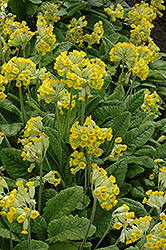Plant Height: 4 inches
Flower Height: 10 inches
Spacing: 6 inches
Sunlight:
![]()
![]()
![]()
Hardiness Zone: 2a
Other Names: Primrose, Polyanthus
Ornamental Features
English Cowslip features delicate panicles of lightly-scented yellow tubular flowers with tan sheaths at the ends of the stems in early spring. Its small serrated oval leaves remain green in colour throughout the season.
Landscape Attributes
English Cowslip is an herbaceous perennial with tall flower stalks held atop a low mound of foliage. It brings an extremely fine and delicate texture to the garden composition and should be used to full effect.
This is a relatively low maintenance plant, and should be cut back in late fall in preparation for winter. Gardeners should be aware of the following characteristic(s) that may warrant special consideration;
- Self-Seeding
English Cowslip is recommended for the following landscape applications;
- Mass Planting
- Rock/Alpine Gardens
- Border Edging
- General Garden Use
Planting & Growing
English Cowslip will grow to be only 4 inches tall at maturity extending to 10 inches tall with the flowers, with a spread of 8 inches. When grown in masses or used as a bedding plant, individual plants should be spaced approximately 6 inches apart. Its foliage tends to remain low and dense right to the ground. It grows at a fast rate, and under ideal conditions can be expected to live for approximately 5 years. As an herbaceous perennial, this plant will usually die back to the crown each winter, and will regrow from the base each spring. Be careful not to disturb the crown in late winter when it may not be readily seen!
This plant performs well in both full sun and full shade. It does best in average to evenly moist conditions, but will not tolerate standing water. It is not particular as to soil type or pH. It is somewhat tolerant of urban pollution, and will benefit from being planted in a relatively sheltered location. Consider applying a thick mulch around the root zone in both summer and winter to conserve soil moisture and protect it in exposed locations or colder microclimates. This species is not originally from North America.
Disclaimer - This resource is provided for informational purposes only and does NOT reflect current availability. Inventory varies seasonally, so we cannot guarantee that every plant will be in stock at all times - please contact your favourite GardenWorks location directly for current availability. It does not include our entire inventory of plants, so be sure to visit GardenWorks to see varieties that may not be represented on this list.

